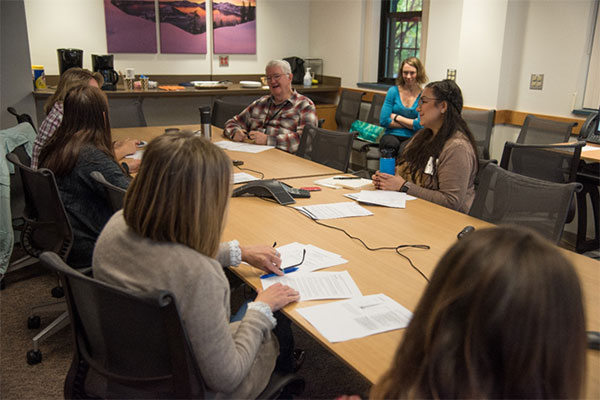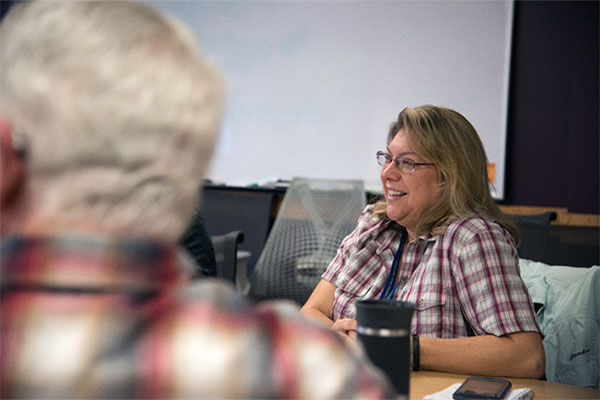 |
Incorporating Veterans' Perspectives into ResearchHSR&D’s monthly publication Veterans’ Perspectives highlights research conducted by HSR&D and/or QUERI investigators, showcasing the importance of research for Veterans – and the importance of Veterans for research. In the March 2019 Issue:Incorporating Veterans' Perspectives into Research |
CIVIC MissionThe mission of HSR&D’s Center to Improve Veteran Involvement in Care (CIVIC) is to conduct research that empowers Veterans to improve their health through engagement in self-care, engagement with VA and non-VA healthcare systems, and engagement in the research process.IntroductionThe perspectives of Veterans are crucial to conducting impactful VA research. The researchers at HSR&D’s Center to Improve Veteran Involvement in Care (CIVIC) in Portland, OR remind themselves of this all the time. Although many CIVIC researchers are VA physicians who take care of Veterans, most VA researchers did not serve in the military and do not use VA healthcare. To compensate for this difference in perspective and perform research that is optimally relevant to Veterans, CIVIC recommends to its 18 core researchers that they incorporate Veterans’ perspectives into their studies in one of two ways:
CIVIC Veteran Engagement Group for ResearchThe CIVIC Veteran Engagement Group (VEG) is a group of community Veterans who meet monthly and review research studies being planned or conducted by CIVIC researchers. The Engagement Group offers its ideas on questions ranging from the importance of the studies, how to best recruit Veterans to participate, the types of questions Veterans should be asked, and how to overcome barriers encountered as the study goes along. In the first 20 months after the CIVIC Veteran Engagement Group was formed in 2015, 17 unique investigator teams (researchers and their research assistants) made 32 presentations to the CIVIC VEG. 
Members of the CIVIC Veteran Engagement Group for Research meet with CIVIC study team Impact of InvolvementThe involvement impacted their own approaches to healthcare, including being “more of an advocate for self.” As one member noted, “I am seeing my doctor more often…and I am communicating with him more about anything that goes on with me.”Engagement Group members note the many personal benefits of VEG participation. As one Veteran said, “this is another way to serve.” Another echoed, “all my years in the Army…I was always helping soldiers constantly.” Engagement Group members found the monthly meetings offered an opportunity to “learn new things,” “delve into science,” and offered “greater appreciation of research.” Personally, they enjoyed a “chance to be more involved in the VA community.” The involvement impacted their own approaches to healthcare, including being "more of an advocate for self." As one member noted, "I am seeing my doctor more often...and I am communicating with him more about anything that goes on with me." 
Veteran member of the Veteran Engagement Group, Cassandra Krawec-Paul, Staff Sergeant (USA-R) RecommendationsRecommendations from Veteran Engagement Group members are frequently incorporated into studies before they are submitted for funding. For example, in one study members recommended that Veterans have the option of having results of some extensive psychological tests be made available to participants’ clinicians as a way of improving recruitment.Researchers also find the feedback from Veterans valuable. As one investigator said, “… We have ideas about how healthcare works. They come up and say, ‘you know that’s really not what’s happening.’” We were trying to improve recruitment and think about how to do that, then Veteran Engagement Group members say things like, “well you know we don’t really answer our phone anyway.” Recommendations from Veteran Engagement Group members are frequently incorporated into studies before they are submitted for funding. For example, in one study members recommended that Veterans have the option of having results of some extensive psychological tests be made available to participants’ clinicians as a way of improving recruitment. In another study, Engagement Group members helped convince the researcher to discard a set of confusing measures that were not related to Veterans’ experiences. CIVIC investigators continue to be enthusiastic about the many tangible ways that Veteran Engagement Group members are improving research. ⇪ Privacy of Suicidal ThoughtsVeterans worried that sharing thoughts about suicide with a healthcare professional who does not know them would lead to unwanted hospitalization and medications.A Window into Veteran Experiences with Suicide Risk AssessmentSuicide is VA’s highest clinical and research priority, with 20 Veterans dying by suicide each day. VA has responded by mandating that VA clinicians ask Veterans about their thoughts of suicide at many clinical encounters. These suicide “screens” are conducted in a variety of settings; for example, by healthcare professionals checking patients in to appointments, in which healthcare professionals may not have prior relationships with the patients. CIVIC researchers conducted qualitative interviews with 34 Veterans who had been deployed previously to Iraq or Afghanistan. Examining everything the Veterans said during those interviews, the researchers found that Veterans considered suicidal thoughts as private, and they often did not want to share these thoughts with “strangers.” Veterans worried that sharing thoughts about suicide with a healthcare professional who does not know them would lead to unwanted hospitalization and medications. The computer reminders that clinicians used to guide their questioning about suicidal thoughts were perceived by the Veterans as disrespectful. In these circumstances the Veterans often did not share their thoughts of wanting to take their own life and opportunities to help the Veteran were lost. On the other hand, the researchers found that the following conditions facilitated Veterans sharing their thoughts of self-harm. ⇪ Factors that Facilitate Veterans Talking with Providers about Suicidal Ideation
Drug OverdosesIn 2017, in the United States there were almost 200 deaths from drug overdoses every day.Veteran Engagement Group’s Impact on Opioid Discontinuation ResearchThe CIVIC Veteran Engagement Group was particularly important in developing studies about discontinuing opioid medications, a focus of CIVIC research. Efforts to decrease prescriptions of high-dose opioids are a priority in VA. In 2017, in the United States there were almost 200 deaths from drug overdoses every day. Opioid abuse can begin with healthcare providers prescribing these medications for chronic painful conditions. Prescriptions of opioids have declined 20% in VA since 2012. The decline has resulted, in part, from new VA policies and education of healthcare providers about alternative approaches to address chronic pain. More research is needed to inform healthcare providers and policymakers on the best ways to taper these medications and how to collaborate with Veterans to find alternatives for their pain. Studying the best ways to taper opioid medications among Veterans who take these medications as prescribed by their VA doctors for chronic pain is an important focus of CIVIC research. Veterans brought personal experiences about pain and opioids from their own lives, and anecdotes from other Veteran friends and family, which served as vital information for CIVIC investigators to learn how Veterans were experiencing these policy changes. One CIVIC investigator recounted the important feedback he’d received from engagement group members on a proposed study of opioid tapering: members underscored a lack of trust by Veterans of VA and VA healthcare providers on this particular topic. The Veterans proposed a change in the study that included meeting with all of the Veterans at the beginning of the study to build rapport and increase trust in the researchers. Quotes from Veteran Engagement Group members on the research study were included in the final grant proposal to communicate the importance and feasibility of the study, which ultimately helped secure funding. A second CIVIC investigator also proposed a project about opioid discontinuation. He was shocked to hear from an Engagement Group member that the Veteran had first learned that the opioid medication he had been prescribed for nine years was discontinued when he went to the pharmacy and found out that the prescription had not been renewed. His physician had not discussed the change with the Veteran but discontinued the medication based on a misunderstanding of VA policy. A more satisfactory approach to the patient’s pain management was reinstituted when the patient returned to the clinician, who realized she had misinterpreted VA policy. The investigator, however, had a greater appreciation of how new policies were impacting healthcare providers and began thinking about a new line of studies based on this anecdote. Veteran TrustThese efforts underscore that building trust with Veterans remains a core element at every point of the research process.Veteran Engagement in Research is about TrustVeterans’ perspectives are particularly important to research because of the sensitive nature of the research performed at CIVIC —thoughts of self-harm and concerns about medication misuse can be associated with shame, silence, and avoidance. CIVIC research shows the importance of adding the perspective of Veterans to all of the studies, which gives their work authenticity. These efforts underscore that building trust with Veterans remains a core element at every point of the research process in order to provide results that can improve Veterans’ healthcare and health. |